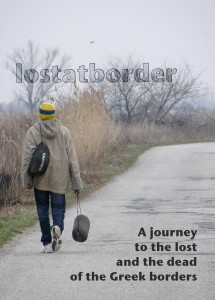LOST AT BORDER reports on the reality of loss and death at the Greek borders. As a close friend of ours said once:
“If you are a refugee and you die nobody asks any questions. But for living somewhere, everybody is questioning you!” We want to break the silence and ask: What happened with all these people whose traces got lost?Accidents and death at border belong unfortunately to the daily experiences of refugees trying to reach a safe haven. The European Border Control Agency FRONTEX in co-operation with national authorities are heightening and thickening the fences and walls around us, controlling and patrolling the borders and externalizing them to European neighbour states such as Turkey, Morocco, Tunisia a.o.
They have created treaties of co-operation in deportations and huge refugee detention camps at the gates of Europe. Trying to cross a number of borders, among them the ones of Fortress Europe is a huge risk of death! The numbers are shocking: more than 2,000 people died in the Mediterranean Sea only in 2011. Each single person left behind a big gap in the life of relatives and friends.
LOST AT BORDER gives the voice mainly to refugees searching and mourning for their beloved. The report was made by a group of antiracist activists from different countries who have been already involved in the search of migrants who got lost at the border between Greece and Turkey.
It can be quite difficult to find information on what has happened when somebody is missing at the border. Apart from the report we want to help and fill this information gap by a new Blog. We want to connect the relatives and friends of border victims to each other and we want to let you know and feel that you are not alone on this journey! We will never forget. We promise to overcome the murderous border regime and to continue our struggle for a welcoming Europe.
Lost at Border



































 Join our page
Join our page

